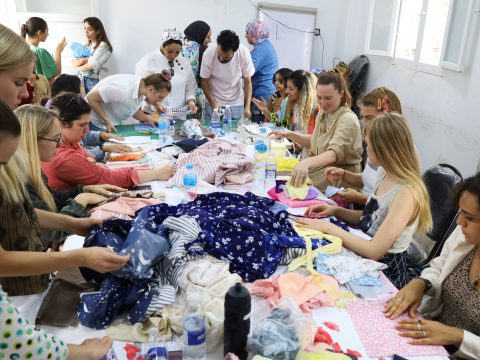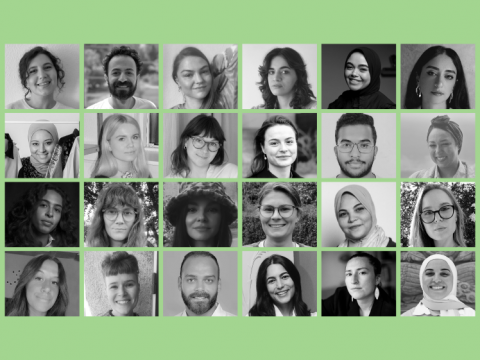
Keeping discussions alive
October 12, 2021
Women Take the Lead
November 1, 2021DEDI Green Gate’s first international workshop kicked off with visits to an organic farm and local grassroots movements, with the participants eager to meet again in Denmark for the second workshop of the program.
By Petra Hass
Distance. This is how it all started. Two groups with more than 3,000 km between them became a part of the same project. DEDI Green Gate.
But the distance quickly disappeared as the participants grew closer together when they met in Cairo on the 25th of September. Through shared experiences, group work, visionary thinking and discussions, they explored new and diverse sustainable business models. Our challenges are connected across borders and countries; therefore, we should work together to find common solutions.
Reconnecting with nature
Throughout the week, it became clear that distance was one of the core issues in the search for sustainable solutions.
The distance between producers and consumers, but also between humans and nature. The first goal at DEDI Green Gate workshop was, therefore, to gain knowledge and raise awareness about the climate-environment-biodiversity crisis in Egypt, and later in Denmark.
“Today many people live in cities, which means that they are cut off from nature and don’t see the consequences of their actions,” says Youhanna Nassif, journeys’ specialist at Wild Guanabana.
To try to reconnect with nature, the group visited Sekem, an organic farm and sustainable development, two hours away from Cairo. The focus at Sekem was on rural agriculture, but throughout the week, the discussions and group work centered more around Urban Agriculture. The goal was, instead of moving humans closer to nature, to move nature closer to humans.

Discussions and good vibes at Qursaya Island. (Photo: Rowan El Shimi // DEDI)
“In Egypt, green spaces are often only accessible for wealthy people, who live in compounds outside of Cairo,” Mostafa Habib, project manager at Very Nile, said during a group work about Urban Forest. The participants discussed how green spaces promote positive social interactions, which have positive effects on mental and physical health.
“My wish is to integrate green areas in poorer communities and neighborhoods both for the environmental benefit and also for the social impact it has been shown to have,” he added.
Social sustainability
The social side of environmental change and sustainable development is, for Very Nile, a crucial part of sustainable solutions.
Very Nile describes itself as the first initiative to develop sustainable means to clean the Nile.
They provide jobs for local fishermen and give classes to women and children of Qursaya island, on which Very Nile is located, whilst cleaning the Nile and surrounding environment. Very Nile pays the fishermen for every kilogram of garbage they collect from the Nile.

Mostafa Habib, Co-founder at Very Nile, showed how Very Nile store and recycle the plastic they collect from the Nile. (Photo: Rowan El Shimi // DEDI)
Abdallah Tawfic was inspired by the visits to Very Nile and to Sekem, to look for holistic solutions.
“The social aspect is as important as the economic aspect.” he said. “It should be sustainable in all aspect.”
The field visits showed the importance of looking at the problem of sustainability with a holistic approach. To tackle the problem as a complete system with several different angles that all need to be included in the sustainable business model.
“This is my community”
The group tour around Cairo was rich and diverse. At one of the stops, the participants visited the part of the city famously known as “the garbage city”.
Garbage city is one of the seven garbage collecting systems located around Cairo, that deals with the waste of the city’s residents. The “garbage people” collect garbage with a door-to-door service and transports it back to the village. Here it is processed through a recycling system, which regardless of its unofficial character, is shown to be one of the most efficient recycling systems in the world.

Salma Enan in Garbage City. (Photo: Rowan El Shimi // DEDI)
After seeing the reality of where the tons of garbage produced in Cairo every day ends up, the group went to Al Azhar park to reflect on the events of the day.
“Today has been a roller coaster” says Mads Dahl, project manager at Mellemfolkeligt Samvirke, lying on the grass at Al Azhar Park. “From smelly trash to nice green grass.”
A handful of participants commented on the role of the community in several of the places they had visited.
“I have seen how small initiatives can have a significant impact on the community,” Says Mohamed Basher, project assistant at the Egyptian Red Crescent. Both Sekem and Very Nile were a reminder of how much a small grassroot movement can change.”
Hai El Zabbaleen, also known as Garbage City, gave another angle to the importance of the community.
“This is my community” said the guide from Hai El Zabbaleen, Moussa Nazmy Zakry, with pride in his voice, while showing the participants around.

Group photo with our guide in Garbage City. A big experience for everyone! (Photo: Rowan El Shimi // DEDI)
Experiencing the community’s crucial part of sustainable change in Egypt, gave the Danish participants some perspective. Compared to how it works in Denmark, where the change and initiatives often come from the top.
“Garbage City has it’s very own system of waste management,” said Yousra Fouda, Project officer at DEDI. “Visiting Garbage City helped the Danes to understand the Egyptian sustainability scene: here, we work from the community level. The change happens from the bottom to the top, which is opposite to what they see in Denmark,” she explained.
Escaping the echo chamber
Even though the participants had the same goals before meeting, the starting point was different. We all live in our own bubbles. The bubble of our context and the bubble of our own challenges in the different professional fields we exist in.
Some focused on how to convert the left-over coffee grounds to food, some organized trips for people to reconnect with nature, some cleaned the beach from plastic and others made projects about sustainability for youth. But after a week full of experiences that both surprised, inspired, changed, and challenged the participants, they got a better understanding of both their own position and their counterparts.
“Seeing how different people’s lives are here in Egypt, has made me realize and appreciate my own privilege,” Josephine Marquard, Co-creator of Gladere Gader, says.

Reflecting was an essential part of DEDI Green Gate. (Photo: Rowan El Shimi // DEDI)
The Egyptian participants understood the different layers in their own society while the Danes got to know a new one. And through cooperation between both two different countries and within different fields, the young sustainable entrepreneurs are moving closer towards identifying solutions.
The experiences in Egypt focused on the importance of integrating the community in the process and seeing how small initiatives can have a significant impact. The participants will have this new knowledge with them, when the Egyptians travel to Denmark in November for the final part of the project.

The trip to garbage city showed new systems and ideas of collecting garbage. (Photo: Rowan El Shimi // DEDI)
DEDI Green Gate was established in 2021 to bring together Egyptian and Danish environmental activists, entrepreneurs and youth concerned with the environment for two international workshops each year, in Egypt and Denmark respectively, under a common theme. Through field visits and experience sharing workshops, the participants dive deep into the theme and the contexts surrounding sustainable development in Egypt and Denmark as well as getting to know and form bonds with their conterparts.
The participants at DEDI Green Gate 2021 were:
Abdel El Khaligi || Banlastic
Ahmed El Tobgy || Collaborative Urbanism & Architecture Lab
Adham Mohamed || Habiba Community
Abdallah Tawfic || Urban Greens
Ahmed Yassin || Banlastic
Carly Brand || Østergro
Christopher Madsen || Mellemfolkeligt Samvirke
Emma Leth || GROselv
Hussein Mohamed || MAQAAD
Josephine Marquard || Gladere Gader
Mohamed Basher || Egyptian Red Cresent
Mads Dahl || Mellemfolkeligt Samvirke
Mariam Elsadek || HEPCA
Mariam Omar || Greenish
Manar Ramadan || Banlastic
Maria West || Clever Coffee
Nicolas Balslev || NaturRetur
Nermeen Farahat || Freelancer
Rasmus Kastrup Brorly || Ørskovshøjs Venner
Tamar I. Bashary || MINO Ung Aarhus
Salma Enan || Habiba Community
Youhana Nassif || Wild Guanabana
Zuzanna Zielinska || Connecting Grounds
For further information and inquiries about this project, please contact the project team:
Rana Khamis, Head of Civic Partnership Program, rk@dedi.org.eg
Yousra Fouda, Project Officer, ywf@dedi.org.eg
Janne Winther, Project Consultant, jannewintherj@gmail.com




